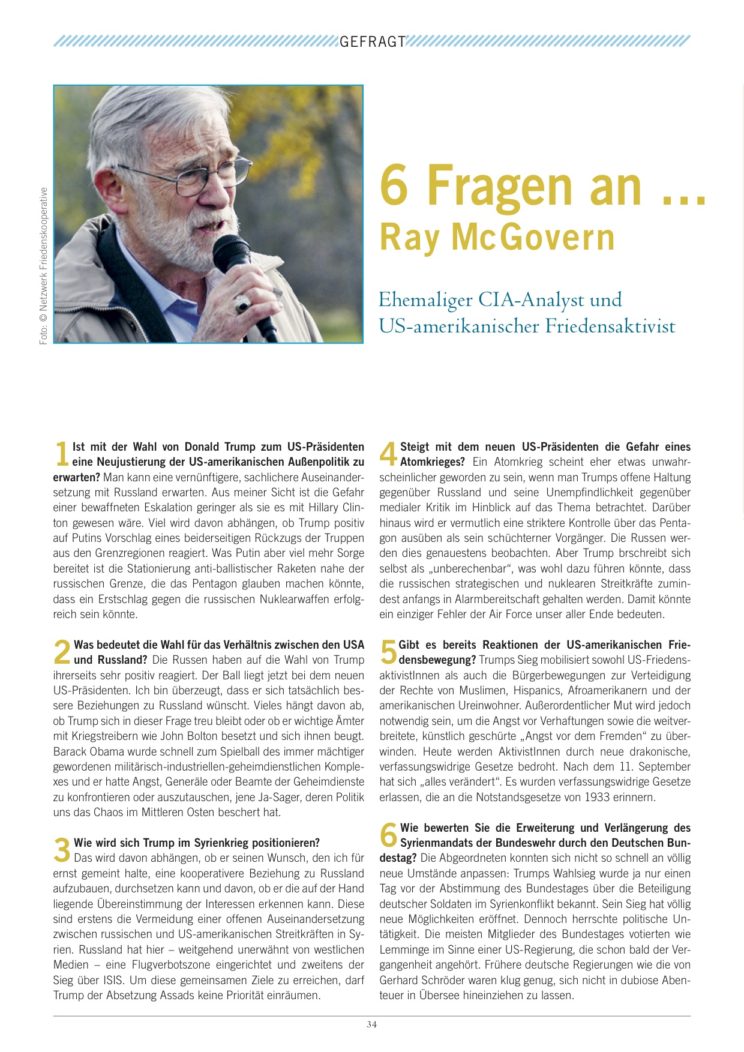Ray was in Berlin during the U.S. election. There was, of course, immense interest (tinged with considerable shock) regarding what to make of Trump and what his election could mean for Germany and East-West relations. When Ray got back home a week later, he was asked to respond to “Six Questions” for Forum, the main publication of the German affiliate of International Physicians for the Prevention of Nuclear War/Physicians for Social Responsibility, one of the most important peace organizations in Germany. Not surprisingly, the questions home in on issues of most importance to Germany, concerns not discussed very much in the U.S. – yet.
Since no English version will be published, we translated (below) the one-page piece just sent to Ray. Pressed for time, Ray emailed his answers in English on Nov. 17. He has now checked the IPPNW translation. It is accurate. (Actually, the interview sounds a lot better in German!)
For the German speakers, the text in German can be found at the bottom of this post.
++++++++++++++++++++
- Ist mit der Wahl von Donald Trump zum US-Präsidenten eine Neujustierung der US-amerikanischen Außenpolitik zu erwarten?
With the election of Donald Trump can one expect an adjustment in U.S. foreign policy?
One can expect a more reasonable, business-like approach to Russia. In my view, the immediate danger of armed escalation is less that would have been the case if Clinton had won. Much will depend on whether Trump reacts in a positive way the Putin’s suggestion of a mutual pullback of troops from the border areas. What worries Putin even more is the stationing of ABM bases around Russia’s periphery, which could lead Pentagon leaders to believe that a first-strike against Russian strategic forces would be successful.
- Was bedeutet die Wahl für das Verhältnis zwischen der USA und Russland?
What does the election mean for relations between the U.S. and Russia?
For their part, the Russians have reacted in a very positive way to the election of Trump. The ball is now in Trump’s court. I believe Trump really does want better relations with Russia. Much will depend on whether Trump turns out to be “his own man” or appoints and defers to warmongers like John Bolton in key posts. Barack Obama quickly became putty in the hands of the so-called Deep State — afraid of confronting or replacing the Generals and intelligence officials – the “yes-men” — whose policies brought chaos to the Middle East.
- Wie wird sich Trump im Syrienkrieg positionieren?
What will Trump’s position be on war in Syria?
This will depend on whether he can implement his wish (which I believe is genuine) to pursue a more cooperative relationship with Russia – and on whether he can see the clear congruence of interests. Those are: (1) preventing an open clash between Russian and U.S. armed forces over Syria, where Russia has imposed a no-fly zone (a fact virtually ignored in Western media); and (2) defeating ISIS. To act on this convergence of interest, Trump must not give priority to the “first Assad must go” approach.
- Steigt mit Trump die Gefahr eines Atomkrieges?
Has the danger of nuclear war increased with Trump?
Nuclear war seems somewhat more remote, given Trump’s open attitude toward Russia and his imperviousness to media criticism on that score. Moreover, he is likely to take more effective control over the Pentagon than his shy predecessor; the Russians will be watching that closely. But Trump’s self-trumpeted “unpredictability” is likely to have Russian strategic forces on high alert, at least initially. Thus, an Air Force mistake could mean the end of all of us.
- Gibt es bereits Reaktionen der US-amerikanischen Friedensbewegung?
Are there already reactions in the U.S. peace movement?
Trump’s win is already galvanizing U.S. activists for peace as well as for justice for Muslims, Hispanics, African Americans, and Native Americans. Exceptional courage will be required, though, to overcome the fear of arrest, as well as the widespread, artificially stoked “fear of the other.” After 9/11 “everything changed” – very much like after the burning of the Reichstag in 1933. Activists now face draconian, unconstitutional laws passed after 9/11 – laws reminiscent of the “emergency laws” passed in 1933.
- Wie bewerten Sie die Erweiterung und Verlängerung des Syrienmandats der Bundeswehr durch den Deutschen Bundestag?
How do you evaluate the German Bundestag’s vote to widen and prolong the mandate for involvement of German armed forces in Syria?
It is difficult for legislators to adapt quickly to totally new circumstances – like Trump’s victory just one day before the Bundestag voted on participation of German forces in the Syrian conflict. Trump’s victory opened completely new possibilities. Yet, inertia prevailed. Most Bundestag members voted like lemmings to please a U.S. administration soon to be gone. Earlier German governments – like that of Gerhard Schroeder – were wise to avoid being dragged into highly dubious adventures overseas.

